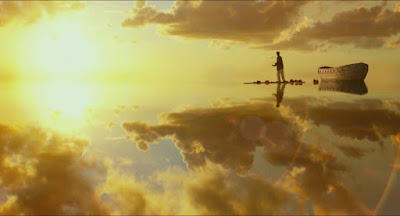Remember that Paper #3 is due next Friday, the 16th! Keep reading and thinking about connections between this book and Persepolis, and how each one can help us see some of the big themes in our own lives. Consider what these books are trying to teach us, and how living through their experiences can improve (or help us appreciate) our own.
Additionally, here are some passages from the reading that you might want to think about and consider for next class (in-class writing prompts???) or for your Paper #3.
Page 177: "For the first time I noticed...that my suffering was taking place in a grand setting. I saw my suffering for what it was, finite and insignificant, and I was still. My suffering did not fit anywhere, I realized. And I could accept this. It was all right. (It was daylight that brought my protest: No! No! No! my suffeirng does matter. I want to live!...Life is a peephole, a single entry onto a vastness--how can I not dwell on this brief, cramped view I have of things? This peephole is all I've got!"
Page 183: "I wept heartily over this poor little deceased soul. It was the first sentient being I had ever killed. I was now a killer. I was now as guilty as Cain. I was sixteen years old, a harmless boy, bookish and religious, and now I had blood on my hands. It's a terrible burden to carry. All sentient life is sacred. I never forget to include this fish in my prayer."
Page 192: "I did not count the days r the weeks or the months. Time is an illusion that only makes us pant. I survived because I forgot even the very notion of time."
Page 206: "Tigers, indeed all animals, do not favour violence as a means of settling scores. When animals fight, it is with the intent to kill and with the understanding that they may be killed. A clash is costly. And so animals have a full system of cautionary signals designed to avoid a showdown, and they are quick to back down when they feel they can."
Page 207: "My greatest wish--other than salvation--was to have a book. A long book with a never-ending story. One I could read again and again, with new eyes and a fresh understanding each time."
Page 215: "To be a castaway is to be a point perpetually at the centre of a circle. However much things may appear to change--the sea may shift from whisper to rage, the sky might go from fresh blue to blinding white to darkest black--the geometry never changes. Your gaze is always a radius. The circumference is ever great. In fact, the circles multiply. To be a castaway is to be caught in a harrowing ballet of circles. You are at the centre of one circle, while above you two opposing circles spin about."
Page 217: "The worst pair of opposites is boredom and terror."
